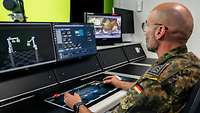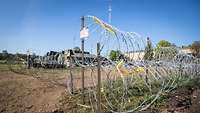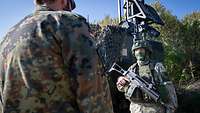
Silent and Alert: Exercise Vigilant Owl
Exercise- Date:
- Reading time:
- 4 MIN


Service members of the German 911th and 912th electronic warfare battalions trained Lithuanian soldiers in electromagnetic warfare via the use of a radar sensor. After learning the basics in Germany, the Lithuanians were able to enhance their practical knowledge.

Not just in Lithuania, but with the Lithuanians. A central part of the Exercise is the training of Lithuanian EW Forces
Bundeswehr/Stefan UjThe Lithuanian soldier watches his screen closely and listens to the sounds coming from his headphones. After a few seconds he takes them off and reports his German instructor: ‘The radar station of a small airfield 23 kilometres north of here.’ The German radar spotter sitting with him in the APC Fuchs makes a note, compares it with his own data and finally says “Teisingai.” – “That’s correct.”
German EW Forces conduct the movement and reconnaissance exercise Vigilant Owl since 2020 in Lithuania. Main objectives are the further improvement of their own expertise in the field of electromagnetic warfare and training the Lithuanian comrades on the German systems. It’s a win-win situation for both sides: The Lithuanians gain more practical knowledge in EW and the Germans can cooperate with their Baltic comrades and exchange their experiences. Lithuania is located at the eastern NATONorth Atlantic Treaty Organization-Flank. Therefore, the cooperation must be regularly trained. Major Nedas from the Lithuanian defense staff explains: “The Exercise Vigilant Owl is not just a training with an important system, but it also sends a message of cohesion and combined strength to the outside.

A Fuchs in the field: The camouflage works and the APC Fuchs seems to disappear into the bushes
Bundeswehr/Stefan UjThe Lithuanians are being trained in the use of the APC Fuchs with the additional module for multiband radio sensors, the main German system for spotting radar stations. These enemy stations could then be fired upon by allied artillery to rob the enemy of their electronic sight. A bit advantage, not just on the digital battlefield.
The Exercise presents a great benefit for the Lithuanians. OR-5 Ignas L., member of the five year old Lithuanian EW force, explains, why the look beyond the horizon is so important: “The Germans are able to convey the operation of the system and the needed knowledge very well. After a break of a few months, we have been able to find quickly our rhythm again. It’s a bit like riding a bike, you don’t forget how to do it.
Major Nedas agrees: “The training itself is important, but the presence of the Germans means a closer cooperation and a vital exchange of work principles. Despite the fact, that our systems, which we currently use, and the ones we are going to acquire are slightly different, the basics of operation are the same. That means we can learn a lot from the Germans.”

A clear division between the Lithuanian base and the small German camp is achieved via a barbed wire fence. Because of the technology used by the German EW Forces, there are strict rules inside
Bundeswehr/Stefan UjAround 80 German soldiers of the 911th and 912th EW battalion had to move around 40 vehicles and establish a small camp within a Lithuanian base. Additionally, several compatible positions were established to gain the best perquisite for training. While the host nation Lithuania is doing the logistical support with food and fuel for the Germans, they have a small maintenance and repair component in Lithuania. OR-6 Markus F. (Name changed), the maintenance sergeant in charge, explains their job and their own demands to themselves: “If something breaks or stops working, we’re here. It doesn’t matter if it’s a headphone with a faulty jack or a clogged filter of one of the generators. What we can’t fix here, we have to send back to Germany. Because of the high demands and the stress on the equipment, we need a good reach-back where spare parts can be delivered quickly.

The Lithuanian Forces have not only participated in the exercise to improve their EW capabilities, but they also provided real life protection to the German and Lithuanian soldiers in their positions
BundeswehrAlong with the practical exchanges between the soldiers, the German troops also make another valuable experience: the acceptance and continuous support by the Lithuanian population for their own armed forces and their partners is vastly different from Germany: “The support from the Lithuanians is immense.” Says Max M. (Name changed), the leader of the German troops. The reason is the turbulent history of Lithuania, especially because of her aggressive neighbor to the east and the safety that the NATONorth Atlantic Treaty Organization Forces bring to the Baltic states. This has led to some surprises in their daily work: “The stay in Lithuania necessitates a big adjustment for my soldiers, especially in traffic. We’ve had to brief our drivers that the traffic laws for convoys are very present in the minds of the Lithuanian people. If we would have been stopped at a red traffic light like in Germany, we would have lost our Lithuanian escort.” The exercise Vigilant Owl went on for several weeks and presents a good opportunity for the German EW forces to train and to live camaraderie with their NATONorth Atlantic Treaty Organization-Partners. Always according to the motto: We are stronger together.
by Luna van Balen email